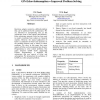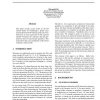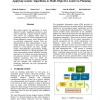GECCO
2000
Springer
15 years 5 months ago
2000
Springer
This paper introduces a new collective learning genetic algorithm (CLGA) which employs individual learning to do intelligent recombination based on a cooperative exchange of knowl...
119
Voted
GECCO
2000
Springer
15 years 5 months ago
2000
Springer
In this paper we describe a method for improving genetic-algorithm-based optimization using informed genetic operators. The idea is to make the genetic operators such as mutation ...
115
click to vote
GECCO
2000
Springer
15 years 5 months ago
2000
Springer
Real-time, adaptive control is a difficult problem that can be addressed by EC architectures. We are interested in incorporating into an EC architecture some of the features that ...
117
Voted
GECCO
2000
Springer
15 years 5 months ago
2000
Springer
This paper extends recent results in the GP schema theory by formulating a proper exact schema theorem for GP with one-point crossover. This gives an exact expression for the expe...
138
click to vote
GECCO
2000
Springer
15 years 5 months ago
2000
Springer
The paper discusses three major issues. First, it discusses why it makes sense to approach problems in a hierarchical fashion. It de nes the class of hierarchically decomposable f...
138
Voted
GECCO
2000
Springer
15 years 5 months ago
2000
Springer
Reinforcement learning (RL) is one of the machine learning techniques and has been received much attention as a new self-adaptive controller for various systems. The RL agent auto...
100
click to vote
GECCO
2000
Springer
15 years 5 months ago
2000
Springer
It has been argued that optimal per-locus mutation rates in GAs are proportional to selection pressure and the reciprocal of genotype length. In this paper we suggest that the not...
128
Voted
GECCO
2000
Springer
15 years 5 months ago
2000
Springer
We describe the use of grammars as an approach to automatic function definition in Grammatical Evolution. The automatic generation of functions allows the evolution of both the fu...
127
Voted
GECCO
2000
Springer
15 years 5 months ago
2000
Springer
This paper explores the application of multiobjective Genetic Algorithms (mGAs) to rural land use planning, a spatial allocation problem. Two mGAs are proposed. Both share an unde...
108
Voted
GECCO
2000
Springer
15 years 5 months ago
2000
Springer
We propose a new Genetic Algorithm (GA) for solving the minimum span frequency assignment problem (MSFAP). The MSFAP is minimizing the range of the frequencies assigned to each tr...



